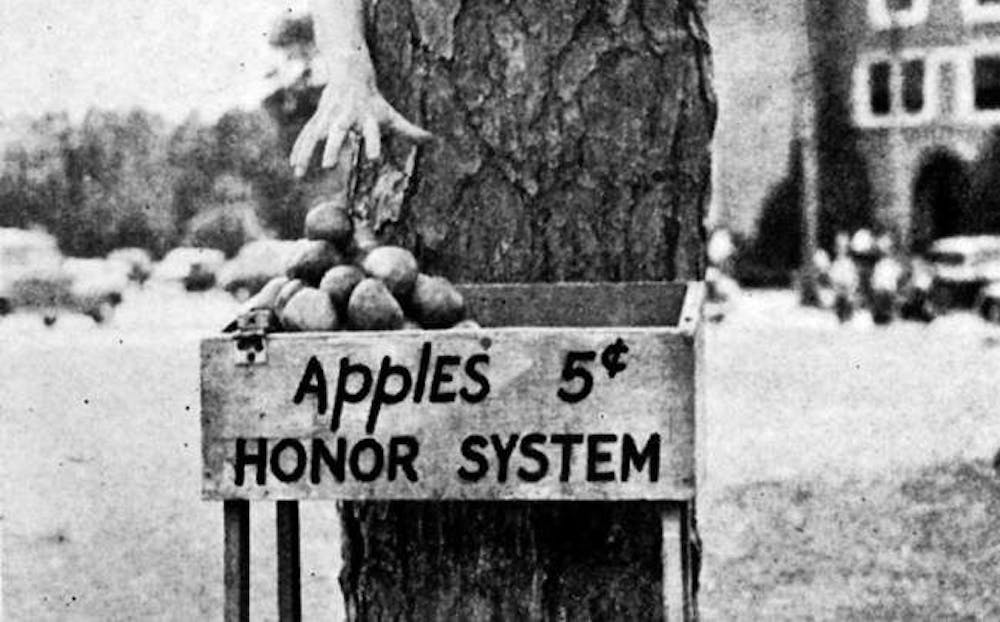Joe Garron vividly remembers the wooden bins that offered up red apples to UF students throughout the day.
“You get a little hungry when you’re walking from class to class,” said Garron, a 1957 UF alumnus.
In the 1950s, students paid 5 cents when they took an apple from one of the unsupervised bins, and they were expected to report those who stole, a tradition known as Honor Apples.
Today, the Florida Cicerones are flashing back to the ‘50s.
From 11:30 a.m. to 2 p.m., the Florida Cicerones will be giving away 100 free apples on Turlington Plaza, combining the old tradition with the newer one of walking through Turlington, said Anna Shao, Florida Cicerone and tradition keeper co-chair.
Shao said the event shares the apple tradition from UF’s past, and students can also fill one of the photo slots in their F Books, a piece of graduation memorabilia that documents completed traditions.
Shao, a 20-year-old UF biochemistry junior, said students don’t think about the everyday traditions they complete, such as walking through Turlington, living in a dorm or eating in a dining hall.
When Garron, 81, attended UF, the Honor Apples were commonplace.
Jenna Cohen, Florida Cicerone and tradition keeper co-chair, said these types of traditions are remembered more than classes or the long nights spent in Library West.
Cohen, 21, said common traditions can serve as conversation starters with other UF alumni.
As a first-generation UF student, Cohen said the traditions have helped her feel close to other UF graduates.
“It’s nice to still be able to feel you’re connected,” the anthropology and economics junior said.
Cohen said the Honor Apples were only briefly mentioned when she learned the university's traditions as a Florida Cicerone. After looking through yearbook archives, she found pictures of the fruit bins.
They were everywhere, she said.
Cohen said while students in the yearbook photos had old-fashioned hairstyles and dated clothes, they were taking part in the same traditions that current students participate in.
"These people stood exactly where you stood three hours ago," Cohen said.
This makes her feel “eternal,” she said. As Cohen looks through black-and-white photographs of past students, she said she hopes a future student will look at a picture of her and feel a connection.
Although the Honor Apples aren’t found around campus anymore, the university’s honor code still exists, and students sign it on most exams.
The honor code was adopted as a campus-wide policy in 1916, according to the class of 2016’s "F Book."
Alto Straughn, who graduated from UF in 1957 with his master’s in animal science, said the honor system was widespread when he was a student.
While at UF, he said that the honor system and its apples probably influenced him positively, but he doesn’t think of them often. Instead, he focuses on Florida sports.
“I like the tradition of winning football games,” Straughn, 80, said, laughing about his favorite UF pastime.
Garron said he remembers the apples well. He was proud to go to a university that trusted him to be honest.
It was common for professors to step out of the room during exams, he said. They trusted that students wouldn’t cheat, just as they assumed that students wouldn’t steal Honor Apples.
Shao and Cohen said they are unsure of when and why the Honor Apples tradition died. The class of 2016 “F Book” does not indicate the year or reason for the tradition’s end.
Through the honor code and its apples, the university taught students to have integrity, Garron said.
“Honor meant an awful lot,” he said.
[A version of this story ran on page 1 - 4 on 2/27/2015 under the headline “Honor Apples remind students of UF tradition, the honor code”]
In the 1950s, students paid 5 cents when they took an apple from one of the unsupervised bins, and they were expected to report those who stole, a tradition known as Honor Apples.






